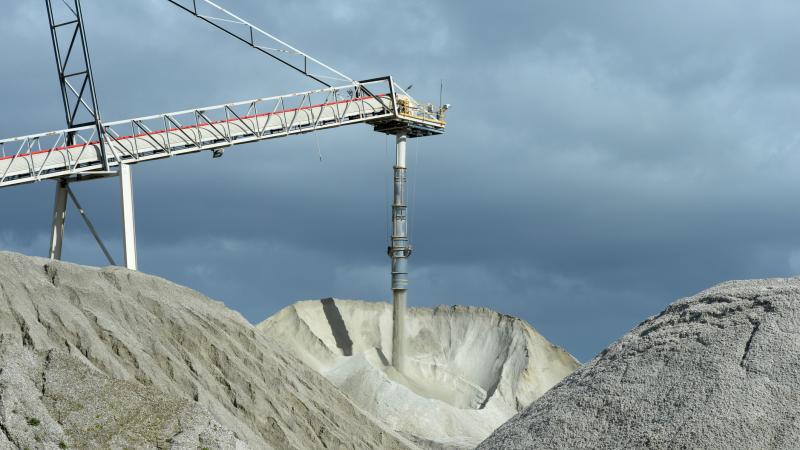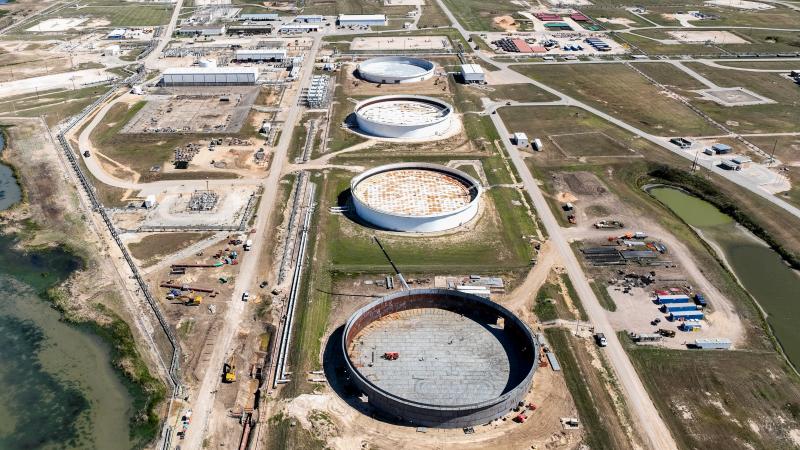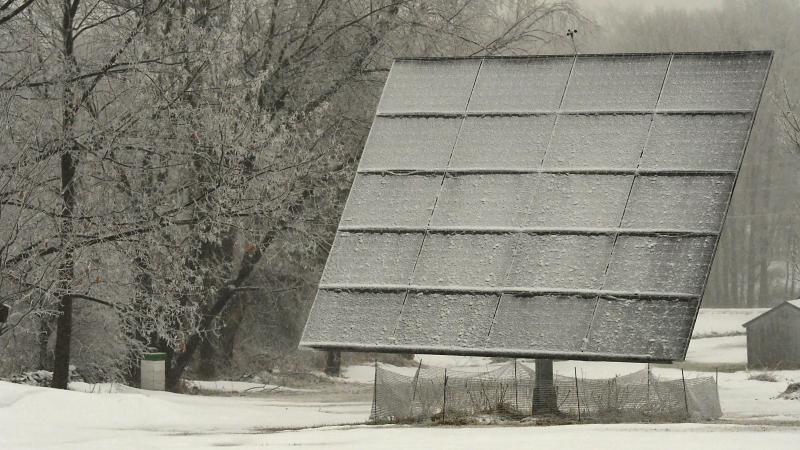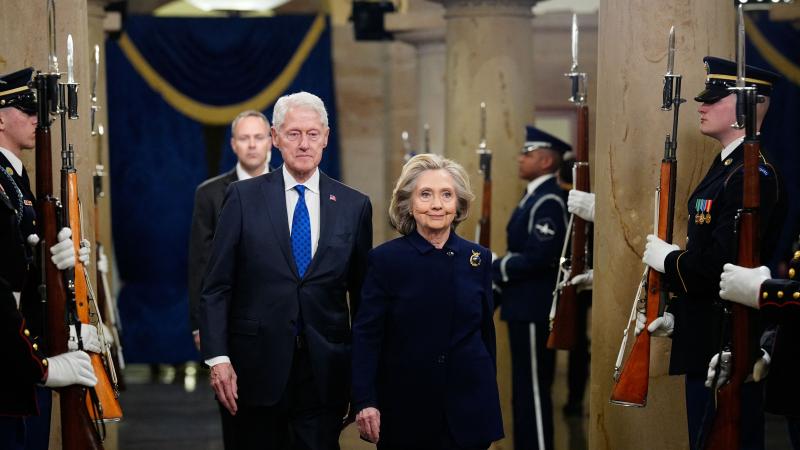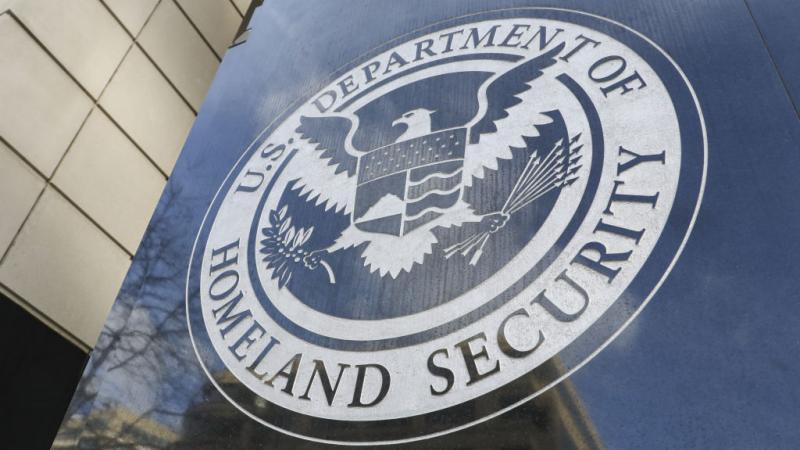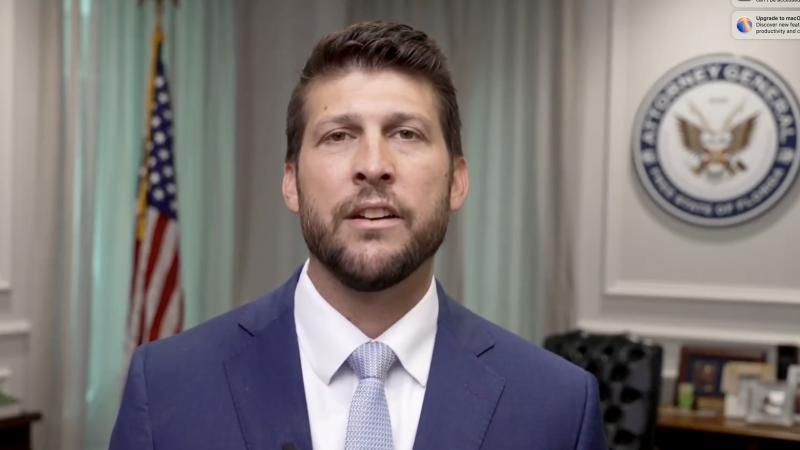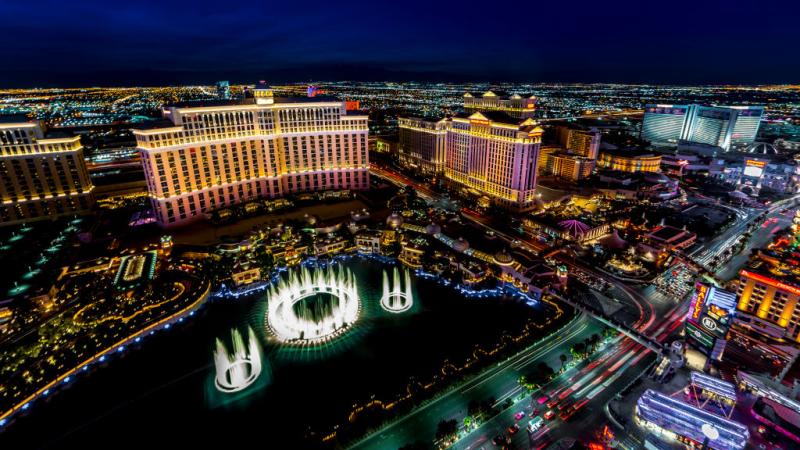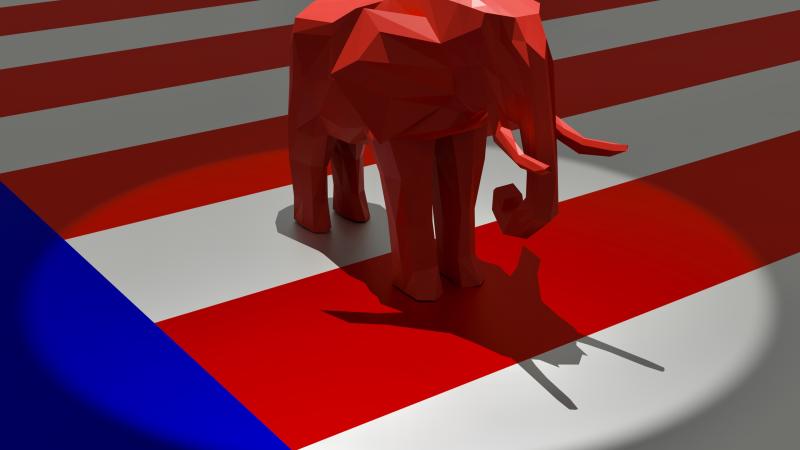Activists use AI to identify climate 'deniers' and pressure social media companies to censor them
"Hot Air" created a database of online content the researchers call climate "misinformation." They are asking social media companies to moderate the content. Critics say they're disguising a campaign for censorship against climate skeptics as a concern for the spread of false information.
Climate activism has had a rough year. Voters elected a president who had called climate change a “hoax.” Though Democrats had hoped such statements would doom Donald Trump’s campaign, polls showed voters rated climate change at the bottom of their priorities, and the policies of "The Green New Deal" promised by Kamala Harris did not rate highly enough for her to avoid a crushing defeat.
After Trump won the election, investment firms pulled out of net-zero alliances, and many companies are scaling back their net-zero commitments. Shortly after, "Just Stop Oil" – the group notorious for throwing soup on paintings, blocking roads, disrupting events, and gluing themselves to various antiquities – announced it would stop such high-profile protests.
Justifying censorship with "flawed" data
Tortoise Media, considered a leftwing British news site, launched a campaign called "Hot Air" this month that blames the shift in public support for climate policies on the spread of what it calls “misinformation.”
“Hot Air: the danger of climate misinformation” purportedly uses AI to create a database of online content expressing skeptical views of the “climate crisis” narrative. The goal of the initiative is to identify influencers and publications that are spreading this alleged “misinformation” online and get social media companies to remove the content.
According to their methodology, they "identified 274 online actors and 129,334 posts from those actors which we collated into the Hot Air tool. Our research encompassed X, YouTube, TikTok and various news websites and blogs that we identified as frequently disseminating climate change counter-narratives."
That methodology, however, is deeply rooted in data sets from notorious censorship advocates when it comes to matters salient to leftwing readers. Their website says "To identify actors on YouTube, we started with the list identified by the Center for Countering Digital Hate (CCDH) in their research and with known climate content creators." CCHD itself has long been criticized for its research flaws. As far back as 2021, when CCHD published a list of "climate deniers," Facebook spokesperson Andy Stone called the methodology "flawed," arguing that the study represents just 0.3 percent of the "over 200 million interactions on English public climate change content from Pages and public groups over the same time period," The Washington Post reported.
“Pressure on platforms to filter out misinformation online has given way to a climate that favors free speech – the question is whether it also favors the unchecked spread of falsehoods and conspiracy theories,” the campaigners explain in an article on the effort.
An environmental blacklist
The Hot Air project coordinators identified 274 influencers and nearly 130,000 posts they’d posted on X, YouTube, TikTok and other news sites and blogs. Among the notable individuals and publications that were deemed to be spreading misinformation by the project coordinators are Daniel Turner, founder of Power the Future, and entrepreneur and former Republican presidential candidate Vivek Ramaswamy.
Among the publications deemed to be spreading misinformation are “The Honest Broker,” a Substack publication by Dr. Roger Pielke, Jr., retired professor of environmental science at the University of Colorado-Boulder, the Daily Mail and “Watts Up With That,” a blog founded by Anthony Watts, meteorologist and senior fellow with The Heartland Institute.
While the Tortoise Media initiative presents itself as a concern about false information spreading online, critics argue it’s a censorship campaign aimed at silencing legitimate debate on climate change and policies seeking to address it.
Trump effect
Jeff Reynolds, senior editor for Restoration News, a self-described conservative outlet, told Just the News that in the era of the second Trump administration, climate activists are becoming increasingly desperate to maintain commitments to their preferred policies. The “Hot Air” initiative is their effort to help prevent debate on the topic.
“It's the Trump Effect again. You're seeing leadership on energy production and energy reliability, and all of that is anathema to a global warming pseudoscience,” Jeff Reynolds, senior editor for Restoration News, told Just the News.
Wielicki: "This is not journalism. It's gatekeeping."
Hot Air defines three categories of “climate change counter-narratives,” which are deemed to be misinformation. They are “climate denial,” which is the idea that climate change is not happening, “climate delay,” which is disputing the rapid elimination of fossil fuels, and “climate control,” which is arguing that climate policies are more about controlling behavior than addressing global warming.
Dr. Matt Wielicki, former assistant professor of geology and author of the “Irrational Fear” Substack — who is also on the “Hot Air” list of climate offenders — points out that the categories are so vague that they basically apply to anyone questioning climate policy, data interpretation or the mainstream narrative.
Wielicki also points out that Tortoise Media is funded, in part, by “climate-interested backers,” such as Octopus Energy, a renewable energy company that benefits from climate alarmism.
“This is not journalism. It’s gatekeeping. It’s reputational warfare,” Wielicki wrote.
Pielke, the author of “The Honest Broker” Substack, also criticizes the “Hot Air” campaign as a campaign for censorship. He points out that many rational and legitimate arguments about climate policies would be deemed worthy of censorship according to the campaigners. These arguments include claiming that future wealth will allow people to adapt to the impacts of climate change, carbon capture is unproven and expensive, and climate models are uncertain.
"Even stating, falsely in my view, that humans do not affect the climate system is protected speech. Again, this is not complicated," Pielke wrote.
Pressuring social media companies
In the article about its campaign, the authors claim that online platforms are “giving free rein to falsehoods and misleading claims, which are being picked up, boosted by politicians, and sometimes turned into policies.”
They note that social media companies like Twitter and Google, which owns YouTube, have stated in years past that they’d demonetize content that “contradicts well-established scientific consensus” on climate change. TikTok had said it would remove such content.
“Since those pledges were made, climate scepticism has flourished online. Google’s policy does little to deter content that advocates delay or promotes the idea that climate policies are an insidious form of control,” the authors write in an article asking social media companies to control what people see online.
The Hot Air authors reached out to the social media companies to ask about their efforts to combat “misinformation” about climate change. YouTube stated it had demonetized videos that Tortoise had flagged as misinformation. TikTok defended its efforts to remove content that was deemed “misinformation,” and Elon Musk’s "X" did not respond.
Misleading and inaccurate when it suits their agenda
While the authors are concerned with what they call “misinformation,” the article makes statements that are misleading or factually incorrect. The authors, for example, criticize a statement by Nigel Farage, a British politician, claiming that wind is driving up electricity costs in the U.K. “In fact, wind is now one of the cheapest forms of energy,” the “Hot Air” authors claim.
The authors don’t provide a source for their claim, but many credentialed experts disagree, and data from all over the world prove the exceedingly higher cost of "green" power sources. While the fuel for wind is free, the cost of dealing with the intermittency of wind, as well as solar, is costly compared to fossil fuel sources.
Levelized cost of energy (LCOE) studies produced by Lazard and the U.S. Energy Information Administration (EIA) show wind and solar as the cheapest, but these studies don’t account for all the extra costs ratepayers must bear in order to take intermittent sources and maintain grid reliability.
“Making direct comparisons of LCOE…across technologies is problematic and misleading as a method to assess the economic competitiveness of various generation alternatives,” the EIA states in its report.
The authors also write that “climate sceptics” are targeting individual scientists. As an example of this, they point to Dr. Michael Mann, who sued for libel two bloggers who criticized their work. “Last year, Mann won a libel case against conservative writers who called his work ‘fraudulent’ and said he had ‘molested and tortured’ data,” the authors write.
While it is true he did initially win the suit, the authors fail to mention that the original $1 million settlement was reduced to $5,000, that he lost a $500,000 anti-SLAPP suit filed by the National Review, and that he was sanctioned for misconduct during the trial.
Blurring the distinction between scientific process and desired outcomes
The authors also state that Alex Epstein, author of “Fossil Future,” disputes “the scientific consensus on climate science.”
As with their claims about the cost of wind energy, the authors don’t provide any source for their claims. So it’s not exactly clear what they mean by the “scientific consensus on climate change.” Most often, this refers to the scientific consensus on anthropogenic global warming as demonstrated in Cook et al. (2013) and Lynas et al. (2021).
Both studies measure if researchers agree that an observable warming trend is driven primarily by carbon dioxide emissions. The studies find that over 95% agree it is. The studies, which have their critics, do not assess the degree to which the researchers believe warming is dangerous or what policies they support to address it.
In “Fossil Future,” as well as his previous book, “The Moral Case for Fossil Fuels,” Epstein never disputes that carbon dioxide emissions are driving a warming trend. He argues that rapidly eliminating fossil fuels will imperil people and cause more harm than good. Therefore, such policies, Epstein argues, are immoral.
Just the News reached out to Tortoise Media to ask how these claims square with the “Hot Air” researchers’ stated intentions to fight misinformation online, as well as the charge they’re disguising a campaign for censorship as a concern for the spread of inaccurate information. Tortoise Media didn’t respond.
The effect of Desmog might be backfiring
The “Hot Air” campaign follows on the heels of, and the methodology also relies upon, the work of the anti-fossil fuel activist website “Desmog,” which for years has maintained a list of people it deems “climate disinformers.”
Tom Nelson, a podcaster and producer of the documentary “Climate: The Movie,” is on both the “Hot Air” and Desmog lists. He told Just the News he considers it to be an honor that they recognize his work as a resource for disputing their narrative.
“I loved it! Being featured at the top of the list is hilarious and fun for me; I received lots of congratulations for this!” Nelson said.
He said a lot of people have congratulated him on the recognition. These lists, he said, end up being resources for people looking for perspectives challenging the dominant narrative on climate change and net-zero policies. "The climate cult movement is filled with delusional people. If they weren’t delusional, they wouldn’t be climate cultists," he added.
As the article on the campaign notes, perspectives challenging the dominant narrative are flourishing online. This is after a very similar effort by Desmog, as well as well-funded efforts by non-profits to spread the “climate crisis” narrative across media platforms.
Whether “Hot Air” has the intended effect the campaigners seek remains to be seen. It’s not clear that “Hot Air” will have much of an impact on anyone who doesn’t already agree with the campaigners’ opinions.
The Facts Inside Our Reporter's Notebook
Links
- called climate change
- doom Donald Trumpâs campaign
- bottom of their priorities
- pulled out of net-zero alliances
- quit such high-profile protests
- companies are scaling back
- Tortoise Media
- leftwing
- Hot Air: the danger of climate misinformation
- According to their methodology
- Center for Countering Digital Hate
- The Washington Post reported
- campaigners explain
- Competitive Enterprise Institute
- Restoration News
- Restoration News
- identified 274 influencers
- Judith Curry,
- Climate Forecast Applications Network
- Micheal Shellenberger
- Daniel Turner
- Vivek Ramaswamy
- The Honest Broker
- Daily Mail
- Watts Up With That
- Anthony Watts
- searchable database
- Irrational Fear
- Octopus Energy
- also criticizes
- article about the campaign
- credentialed experts disagree
- Lazard
- Energy Information Administration
- he did initially win the suit
- settlement was reduced
- lost a $500,000 anti-SLAPP
- sanctioned for misconduct
- Fossil Future
- Cook et al. (2013)
- Lynas et al. (2021)
- which have their critics
- The Moral Case For Fossil Fuels
- Desmog
- list of people
- Climate: The Movie
- well-funded efforts
- narrative across media platforms
